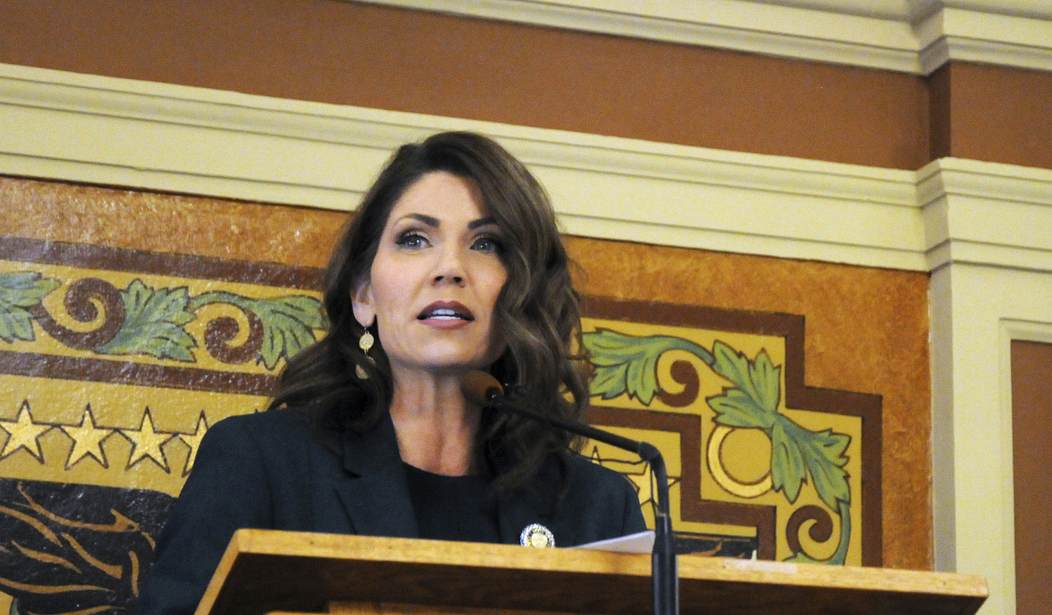Conservative female icon, Governor Kristi Noem (R-SD), shocked her base on Friday when she sent a bill back to the state legislature which would ban biological males from competing in sports against females.
After initially expressing hesitation on Thursday in an interview with The Argus Leader, Noem also spelled out her concerns on Friday in a lengthy twitter thread. The full letter with the governor's suggestions is available through the state news website.
I believe that boys should play boys’ sports, and girls should play girls’ sports. I'm returning House Bill 1217 with the following recommendations as to STYLE and FORM. (1/)
— Governor Kristi Noem (@govkristinoem) March 19, 2021
The legislation, HR 1217, "An Act to promote continued fairness in women's sports," would "prohibit biological males from competing in women’s sports," as the American Principles Project (APP) explained on their website in support of the legislation.
Considering that the governor retweeted the organization's tweet to announce she would sign the bill, that Gov. Noem sent it back to the legislature came as a shock. APP's Jon Schweppe, who serves as the director of government affairs, told Townhall that it was "a bunch of malarkey."
In South Dakota, we're celebrating #InternationalWomensDay by defending women's sports! I'm excited to sign this bill very soon. https://t.co/OU15HOwp2r
— Governor Kristi Noem (@govkristinoem) March 8, 2021
Schweppe raised concerns that what Noem is doing is "proposing to gut the bill to such a degree so it would not have any effect at all." When it comes to Noem's claims that the emphasis is on "Style and Form," Schweppe said this kind of veto, outlined in the South Dakota Constitution, is more so designed for typos, slight changes to sentences, and other such revisions. He even called it "unconstitutional" for Noem to claim to use her veto power in that way and that it would be "a misuse of her executive power."
Recommended
In response to Noem's claims that her suggestions were "to address the potential unintended consequences of HB 1217 as originally enrolled," Schweppe pushed back and emphasized that with such changes, the bill would not have its intended effect. It may be a way for Noem to still claim to support it, he offered.
Keloland.com reported that State Sen. Maggie Sutton had similar concerns about the bill's effectiveness in that case:
Sutton said Friday she was “very disappointed” that the governor issued a style-and-form veto.
“The recommended changes will substantially change the content of the bill. The legality was removed, which leaves the bill with a very weak authority. Removing the collegiate is simply saying that biology matters in high school, but not in college,” Sutton said.
As to why Noem would not sign the legislation, Schweppe pointed out she "only listened to the bill’s most fervent opponents" and likely caved to pressures from the Chamber of Commerce and Board of Regents. One of Noem's stated concerns was:
I am also concerned that the approach House Bill 1217 takes is unrealistic in the context of collegiate athletics. In South Dakota, we are proud of our universities’ athletic programs, and in particular the great strides we have taken to gain national exposure and increase opportunities for our next generation over the past two decades.
Schweppe assured Townhall that there will be pushback forcing Noem to choose between a real veto or signing the bill into law. "Conservatives in the state and Republicans in the legislature do not see this as a legitimate veto," he said.
Terry Schilling, the executive director of APP, also emailed a statement which read:
“We are extremely disappointed to see Gov. Noem break her word on this critical legislation. For more than a week, Noem’s office has frozen out advocates of HB 1217 and instead taken advice from the bill’s most vocal critics, which include the South Dakota Chamber of Commerce and the South Dakota Board of Regents.
“Gov. Noem’s veto would scrap the vast majority of the bill text and would strip protections for female athletes in collegiate sports in the state. Additionally, it would eliminate all reasonable enforcement mechanisms, neutering the legislation so much as to render it meaningless. All the while, Noem continues to claim dubiously that she still supports the bill, hoping South Dakotans will ignore the fact she was responsible for killing it.
“By standing with Joe Biden and the radical left against protecting women’s sports, Noem has irreparably damaged her standing with both her own constituents as well as Americans nationally who have been looking to her for bold leadership. This betrayal will have political consequences.”
Noem didn't herself any favors with the American Civil Liberties Union either, though, which has tweeted against the bill, in South Dakota and other states, and took issue with Noem not vetoing it all together. The Human Rights Campaign had a similar reaction.
BREAKING: South Dakota Governor Kristi Noem failed to fully veto an anti-trans bill and instead sent it back to the legislature.
— ACLU (@ACLU) March 19, 2021
Lawmakers should abandon this bill altogether.
There is no way to make discrimination acceptable.
Make no mistake: @GovKristiNoem is still trying to demonize and exclude trans kids. Keep up the pressure. Call her office at 605-773-3212. https://t.co/rB95pF5i3k
— Human Rights Campaign (@HRC) March 19, 2021
A poll earlier this month from Politco/Morning Consult showed 53 percent supported such legislation, which includes a plurality, at 36 percent, saying they "strongly support" it. The question had asked "As you may know, Mississippi is moving towards banning transgender athletes from participating on women’s sports teams at the state’s high schools and universities. Based on what you know, do you support or oppose banning transgender athletes from competing on women’s sports teams?"
The changes can be considered when legislatures return to the Capitol on March 29.
According to APP, "South Dakota will become the second state to enact legislation protecting women’s sports, and is among 27 states where such legislation has been introduced so far."

























Join the conversation as a VIP Member